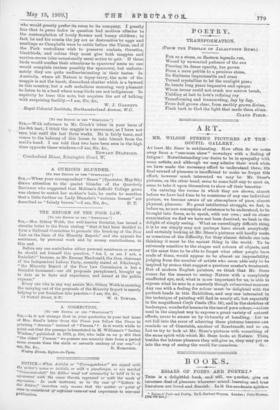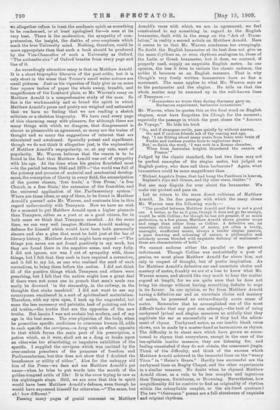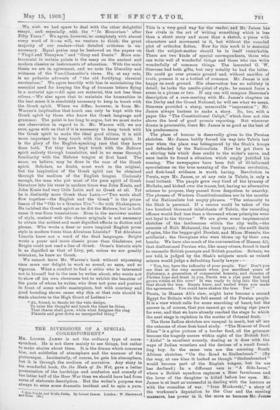B 0 0 K S.
ESSAYS OF POETS . AND POETRY.* Tale is a delightful book, and will, we predict, give an immense deal of pleasure. wherever sound learning, and true literature are loved and flourish. In it the 'academie spirit...
* Emus of Poets and Poetry. By T. Ilerbort Warren. London John Murray. [ION. 6,1,'not.]
tea altogether refuse to treat the academic spirit as something to be condemned, or at least apologised for—is seen at its very best. There is the moderation, the sympathy of com- prehension, the insight, the dislike of ,over-emphasis which mark the true University mind. Nothing, therefore, could be more appropriate than that such a book should be produced by the Vice-Ohancellor of such a University as Oxford. " The authentic airs " of Oxford breathe from every page and line of it.
An exceedingly attractive essay is that on Matthew Arnold. It is a short biographic liieraria of the poet-critic, but it is only short in the sense that Turner's small water-colours are small pictures. Just as his vignettes of Italy give us on some four square inches of paper• the whole sweep, breadth, and magnificence of the Lombard plain, so Mr. Warren's essay on Matthew Arnold is a comprehensive study of the man. So fine is the workmanship and so broad the spirit in which Matthew Arnold's prose and poetry are weighed and estimated that we have no feeling that wo are reading • a sketch criticism or a skeleton biography. We have read every page of this charming essay with pleasure, for although there are many things with which we disagree, that disagreement is almost as pleasurable as agreement, so many are the trains of thought and so many the suggestions of interest that are stimulated and awakened. Specially potent and significant, though we do not think it altogether just, is the explanation of Matthew Arnold's unpopularity, or, at any rate, want of popularity. Mr. Warren believes that the reason is to be found in the fact that Matthew Arnold was out of sympathy with his age. At the time when his genius flourished most the period between 1845 and 1870—" the wet•ld was full of the potency and promise of material and mechanical develop- ment, the conception of liberty in every field, the emancipation of the poorer classes, 'free trade,' a ' free Press,' a free Church in a free State,' the extension of the franchise, and the universal application of the Parliamentary system." Where are these ideas, or any of them, to be found in Matthew Arnold's poems ? asks Mr. Warren, and contrasts him in this regard unfavourably with Tennyson. Now we have no wish for a moment to put Matthew Arnold upon a higher pinnacle than Tennyson, either as a poet or as a good citizen, for in both cases we think that Tennyson excelled. •At the same time, we can very well imagine•Matthew Arnold making a defence for himself which would have been both personally sincere and also a plea that must be held just at the bar of literary history. Matthew Arnold might have argued :—" The things you name are not found positively in my work, but they are found there in the negative sense, and very fully. I did not ignore, nor was I out of sympathy with, those things, but I felt that they each in turn required a corrective, and it fell to my lot, as one who realised the need of such correctives, to bring them before the nation. I did not think of the positive things which Tennyson and others were preaching, but I felt that the nation might lose a great deal if there were not some one to preach that men's souls can easily be drowned in the steamship, in the railway, in the thoughts that shake mankind.' I did not want to see my countrymen smothered in a sort of spiritualised materialism. Therefore, with my eyes open, I took up the ungrateful, but none the less necessary and patriotic, task of pointing out the old truths,—the truths that are the opposites of the new truths. But herein I was not archaic but modern, and of my age in the best sense. The wise physician of the body, when he prescribes specific medicines to overcome human ill, adds to each specific the corrigens,—a drug with an effect opposite to that which forms the main part of his prescription, a potion which, as it were, shall sot as a drag or brake upon an otherwise too stimulating or impulsive exhibition of the specific. I supplied the corrigens which was omitted by the over-zealous preachers of the panaceas of freedom and Parliatnentarism, but this does not show that I doubted the beneficence or utility of either.", Alas for the unhappy old lion of the Press—we dare not use Matthew Arnold's pet name—when he tries to put words into the mouth of the golden-tongued critic of life! It is the crow trying to caw as the nightingale sings.. Still, we are sure that this in spirit would have been Matthew Arnold's defence, even though he would have expressed himself far otherwise,—" The same, but ah ! how different."
Passing many pages of genial comment on Matthew, Arnold's verse with which we are in agreement, we feel constrained to say something in regard to the English hexameter, dealt with in the essay on the "Art of Trans- lation," in reality a second article on Matthew Arnold. Here it seems to us that Mr. Warren condemns too sweepingly.
No doubt the English hexameter at its best does not give us the same rhythms as, or even rhythms analogous to, those of
the Latin or Greek hexameter, but it does, we contend, if properly used, supply an .exquisite English metre. In our opinion, the leas it tries to imitate the classic cadence, the nobler it becomes as an English measure. That is why Clough's very freely written hexameters have so flue a movement. The same applies to what Mr. Warren says as to the pentameter and the elegiac. He tells ns that the whole matter may be summed up in the well-known lines
of Tennyson :—
" Hexameters no worse than daring Germany gave us, Barbarous experiment, barbarous hexameters."
Mr. Warren, when lie quotes this as the final word on English elegiacs, must have forgotten his Clough for the moment; especially the passage in which the poet closes the "Amours de Voyage." He bids his book "Go, and if strangers revile, pass quietly by without answer, Go, and if curious friends ask of thy roaring and age,
Say, I am flitting about many years from brain unto brain of Feeble and restless youths born to inglorious days : But,' so finish the word, was writ in a Roman chamber, When from Janiculan heights thundered the cannon of France.'
Judged by the classic standard, the last two lines may not
be perfect examples of the elegiac metre, but judged as English poetry, who dare call thorn barbarons P Again, what hexameters conic' be more magnificent than " Michael Angelo's Dome, that bad hung the Pantheon in heaven, Raphael's Joys and Graces, and thy clear stars, Galileo "?
But one may dispute for ever about the hexameter. We make our protest and pass on.
Let us return to the more direct criticism of Matthew Arnold. In the fine passage with which the essay closes Mr. Warren uses the following words:—
" The parallel between Matthew Arnold and Gray is not a good one. A better, so far as it goes, though it does not go far enough, would be with Collins; for though he has not greater, if so much perfection, in a few pieces, Matthew Arnold shows greater scope and range than either Gray or Collins. A defective oar, an uncertain choice and mastery of metre, yet often a lovely, unsought, unaffected music, always a tender elegiac passion, a pure drawing and colouring of nature, a philosophic and scholarly aroma blended with exquisite delicacy of sentiment— these are characteristic of both.".
We cannot endorse either the parallel or the general indictment. Though Collins was undoubtedly a poet of genius, we must place Matthew Arnold far above him, not only in respect of thought, but of poetic inspiration. As for Matthew Arnold's defective ear and uncertain choice and mastery of metre, frankly we are at a loss to know what Mr. Warren means, and should like very much to hear the matter argued at length, for we are quite sure that he does not bring his charge without having something definite to urge in its favour. In our opinion, so far from Matthew Arnold having a defective ear and an uncertain choice and mastery of metre, he possessed an extraordinarily acute sense of metre. Remember that he accomplished one of the most difficult tasks that any poet can attempt,—the task of using unrhymed lyrical and elegiac measures so artfully that they captivate the ear as successfully as if they had the adorn- ment of rhyme. Unrhymed metre, as our iambic blank verse shows, can be made by a master-hand as harmonious as rhyme. The difficulty is to cheat ears which have grown so accus- tomed to rhyme that everywhere, except in the case of the
ten-syllable iambic measure, they are listening for, and feeling unsatisfied if they do not obtain, the consonant jingle.
Think of the difficulty, and think of the success which Matthew Arnold achieved in the immortal lines on the "weary Titan " in " Heine's Grave." Hardly less successful are the unrhymed lines on Rugby Chapel, and the other experiments in a similar measure. No doubt when he rhymed Matthew Arnold chose, as a rule, to be less complex and ingenious than Tennyson, Swinburne, or Browning. Nevertheless, how magnificently did he contrive to find an originality of rhythm within the octosyllable couplet, or the six-lined quatrain The two "Obermann" poems are a full storehouse of exquisite and original rhythms. We wish we bad space to deal with the other delightful essays, and especially with . the " In Memoriam' after Fifty Years." We agree, however; so completely with almost every word. of it—as will, we venture to think, the great majority of our readers—that detailed criticism is un- necessary. Equal praise may be bestowed on the papers on "Virgil and Tennyson" and "Gray and Dante." More con- troversial in certain points is the essay on the ancient and modern classics as instruments of education. With the main thesis we are in agreement, and we note the liberality and wideness of the Vice-Chancellor's views. He, at any rate,
is no pedantic advocate of " the old fortifying classical curriculum." We agree. heartily with him in maintaining the
essential need for keeping the flag of humane letters flying in a material age.—All ages are material, this not less than
others.—We also agree that to maintain the humanities in the best sense it is absolutely necessary to keep in touch with the Greek spirit. Where we differ, however, is from Mr. Warren's implication that touch can only be kept with the Greek spirit by those who know the Greek language and grammar. The point is too long to argue, but we must make one observation in regard to it, Mr. Warren will, we are sure, agree with us that if it is necessary to keep touch with the Greek spirit to make the ideal good citizen, it is still more important to keep touch with the. Hebrew spirit. It is the glory of the English-speaking race that they have done both. Yet they have kept touch with the Hebrew spirit entirely through translation, and in no sense through familiarity with the Hebrew tongue at first hand. The same, we believe, may be done in the case of the Greek spirit. Scholars, no doubt, must work in the original, but the inspiration of the Greek spirit can be obtained through the medium of the English tongue. Curiously enough, the man who put moat of the pure spirit of Greek literature into his verse in modern times was John Keats, and John Keats had very little Latin and no Greek at all. Yet he is distinctly more Greek than Letin.—" Two souls shall flow together—the English and the Greek" is the prime lesson of the "Ode to a Grecian Urn."—So with Shakespeare. He imbibed the Greek spirit as he did the Hebrew, but in both cases it was from translations. Even in the narrower matter of style, contact with the classic originals is not necessary to obtain the noblest and most dignified effects in diction and phrase. Who wrote a finer or more inspired English prose style in modern times than Abraham Lincoln? Yet Abraham Lincoln knew not a word of the dead languages. Bright wrote a purer and more classic prose than Gladstone, yet Bright could not read a line of Greek. Orme's historic style is as dignified as that of Livy, yet, unless we are greatly mistaken, he knew no Greek.
We cannot leave Mr. Warren's book without expressing once more our delight in work so sound, so sane, and so vigorous. What a comfort to find a eritic who is interested not in himself but in the men he writes about, who wants not to show off his own cleverness but to exhibit the beauties of the poets of whom he writes, who does not pose and posture in front of some noble masterpiece, but with courtesy and good breeding shows cause why this or that rule should be made absolute in the High Court of Letters " Ab, friend, to dazzle let the vain design, To raise the thought and touch the heart be thine, That charm shall grow, while what fatigues the ring Flaunts and goes down an unrogarded thing."












































 Previous page
Previous page